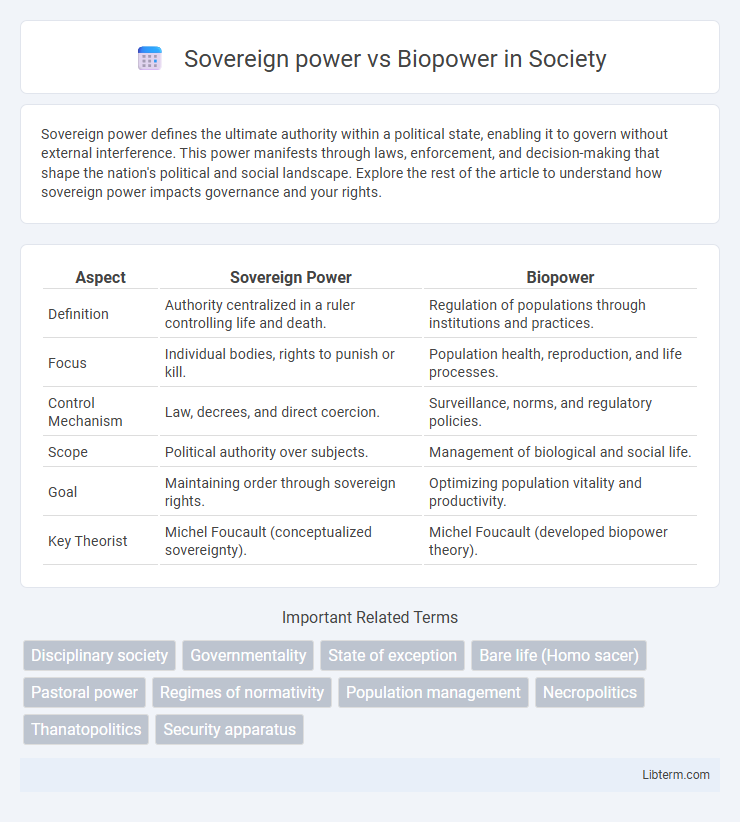Sovereign power defines the ultimate authority within a political state, enabling it to govern without external interference. This power manifests through laws, enforcement, and decision-making that shape the nation's political and social landscape. Explore the rest of the article to understand how sovereign power impacts governance and your rights.
Table of Comparison
| Aspect | Sovereign Power | Biopower |
|---|---|---|
| Definition | Authority centralized in a ruler controlling life and death. | Regulation of populations through institutions and practices. |
| Focus | Individual bodies, rights to punish or kill. | Population health, reproduction, and life processes. |
| Control Mechanism | Law, decrees, and direct coercion. | Surveillance, norms, and regulatory policies. |
| Scope | Political authority over subjects. | Management of biological and social life. |
| Goal | Maintaining order through sovereign rights. | Optimizing population vitality and productivity. |
| Key Theorist | Michel Foucault (conceptualized sovereignty). | Michel Foucault (developed biopower theory). |
Defining Sovereign Power: Historical Origins
Sovereign power originates from the medieval concept of absolute authority held by monarchs who exercised the right to decide life and death over their subjects. This form of power is characterized by its emphasis on territorial control and legal sovereignty, where the ruler's command is supreme and unchallenged within their domain. Historically, sovereign power was justified through divine right and centralized governance, establishing the foundation for modern state authority.
Understanding Biopower: Concept and Evolution
Biopower, a concept introduced by Michel Foucault, refers to the practice of modern states regulating populations through an array of institutions, norms, and knowledge systems that manage life, health, and bodies. Unlike sovereign power, which exercises authority through direct control and the right to take life, biopower operates by fostering life, optimizing populations, and encouraging self-regulation within social and political frameworks. Over time, biopower has evolved to encompass public health policies, demographic surveillance, and the governance of biological processes, highlighting the shift from punitive sovereignty to pervasive administrative control over life itself.
Key Differences: Sovereign Power vs Biopower
Sovereign power centers on the authority of a ruler or state to enforce laws through direct control and the right to take life, primarily exercised through laws and punishment. Biopower operates by regulating populations through institutions, norms, and practices that manage life, health, and biological processes on a large scale. The key difference lies in sovereign power's focus on territorial sovereignty and law enforcement, whereas biopower emphasizes managing populations via surveillance, public health, and social policies.
Michel Foucault’s Influence on Power Theories
Michel Foucault's distinction between sovereign power and biopower revolutionized power theories by shifting focus from the authority to take life to the mechanisms that regulate life. Sovereign power traditionally exercised control through laws and penalties, emphasizing discipline over the body, while biopower operates through institutions and practices that manage populations and biological processes. Foucault's analysis highlights how modern states deploy biopower to optimize life, health, and productivity, fundamentally transforming the exercise of power in contemporary societies.
Mechanisms of Control: Law, Discipline, and Normalization
Sovereign power exercises control primarily through law, enforcing obedience via punishment and legal authority to maintain order. Biopower, on the other hand, operates through discipline and normalization, regulating populations by shaping behaviors, health, and social norms to optimize life and productivity. While sovereign power commands through direct authority, biopower subtly controls through continuous surveillance and the internalization of societal standards.
The Role of the State in Sovereign and Biopower
Sovereign power centers on the state's authority to impose law and command life or death decisions over individuals, emphasizing territorial control and legal punishment. Biopower shifts this dynamic towards managing populations through regulatory controls, public health, and social policies designed to optimize life and productivity at a collective level. The state functions as both enforcer of sovereignty and administrator of biopolitical strategies, balancing coercive power with governance techniques that shape citizen behavior and societal norms.
Case Studies: Practical Examples in Modern Governance
Sovereign power manifests in modern governance through authoritative acts such as emergency decrees and state-sanctioned violence seen in cases like China's Xinjiang policies, where direct control asserts dominance over populations. Biopower operates via regulatory mechanisms managing life and health, evident in public health strategies during the COVID-19 pandemic in South Korea, emphasizing surveillance, vaccination campaigns, and behavioral norms to optimize population well-being. These case studies reveal how sovereign power enforces command through law and punishment, whereas biopower subtly governs through population management and institutional control.
Impact on Individual Rights and Societal Structures
Sovereign power exercises control through the threat or use of direct force, imposing laws and punishments that visibly restrict individual rights and enforce societal hierarchies. Biopower operates by regulating populations through subtle mechanisms such as public health, education, and surveillance, shaping behaviors and social norms without overt violence. Unlike sovereign power, biopower influences societal structures by managing life processes and bodies, often normalizing control in a way that affects individual autonomy more diffusely and persistently.
Biopolitics in Contemporary Policy and Health
Biopower, a concept developed by Michel Foucault, emphasizes the regulation of populations through institutions, norms, and practices aimed at managing life, health, and biological processes. Contemporary policy increasingly leverages biopolitics by integrating public health initiatives, surveillance technologies, and epidemiological data to control disease spread and promote population well-being. This shift from sovereign power's disciplinary control toward biopolitical governance reflects the prioritization of health metrics, vaccination campaigns, and healthcare infrastructure in managing societal risks and enhancing life expectancy.
Future Implications: Shifting Landscapes of Power
Rising biopower reshapes governance by prioritizing population management and health surveillance over traditional sovereign control marked by law and territory. Future implications include enhanced state capacity to regulate life processes, potentially redefining citizenship and social inclusion through biometrics and data analytics. This shift challenges established legal frameworks, demanding new policies to balance individual rights with collective security in increasingly digital societies.
Sovereign power Infographic

 libterm.com
libterm.com